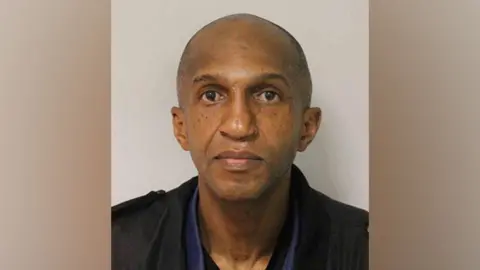Homeless people ‘deeply failed’ as deaths in UK reach record high
7 hours agoMichael BuchananSocial affairs correspondent

 Met Police
Met PoliceThe number of people who died while homeless in the UK reached a record high last year, according to new figures.
The Museum of Homelessness, which compiles the data, said that 1,611 homeless people died in 2024.
The figure is 9% higher than the year before, with the majority of deaths being linked to suicide or drugs, with spice and nitazines becoming increasingly deadly.
Matthew Turtle, director of the museum, said the deaths “show how homeless people continue to be deeply failed”.
Homelessness Minister Alison McGovern described the figures as “heartbreaking” and said the government was “accelerating efforts to tackle the root causes of homelessness”.
‘Increasing levels of poverty’
The data is collated using information from coroner’s courts, media coverage, family testimony and Freedom of Information requests. The government no longer publishes official data on the numbers of deaths of homeless people.
Among those who died was Anthony Marks, 51, who was assaulted in August 2024 near London’s King’s Cross station while sheltering in a bin shed.
Two weeks after being released from hospital, he was readmitted following a seizure and died. Four people have been charged over his death.
“We shouldn’t be surprised that people are dying on our streets,” said Tim Renshaw, chief executive of the Archer Project, a homeless charity in Sheffield.
“We have one of the worst systems in terms of making housing available to the poorest. We are looking at homelessness being related to health factors – trauma, depression, anxiety. And we’ve increasing levels of poverty.”
In November 2024, three homeless women died within 10 days in Sheffield.
One of those, a woman in her 40s, was buried without a single person attending her funeral.
She’d been known to homeless services in Sheffield for a number of years, said Mr Renshaw, but the name they knew her by was not her registered name.
When her funeral was arranged in her official name, no-one recognised her.
“It was an absolute tragedy,” he said. “We had people approaching us saying they’d liked to have attended her funeral.”
Of the 1,611 people who died homeless in 2024, three quarters were men. Two-thirds of the deaths were of people living in temporary or supported accommodation, while 169 were rough sleeping. Eleven were children, though the Ministry said the true figure was likely to be higher.
The figures show that 1,142 deaths were in England, an increase of 16% on the year before.
London had the highest total number of deaths, but the largest increases were in Nottingham, where the number of deaths doubled to 22, and in Exeter, where they more than doubled from eight to 21.
In Northern Ireland, deaths increased by more than a third between 2023 and 2024, to 211. Wales saw a small annual decrease, from 97 to 90.
In Scotland there was an 18% reduction overall from 206 to 168. The Museum of Homelessness found that deaths in both Glasgow and Edinburgh fell by around 40%.
The figures are compiled by the Museum’s Dying Homeless Project. It says its methodology does not include any estimates and that it is the only organisation collating the figures since the Office for National Statistics stopped doing so in 2022.
The deaths come as the number of people living in temporary accommodation across the UK is at record levels, while the number of people rough sleeping in England rose 20% in 2024 to 4,667, according to official statistics.
Child deaths ‘cannot be tolerated’
Experts working with homeless people say they have yet to see any real policy differences since Labour took office.
They welcome Labour’s commitment to building 180,000 homes for social rent over the next decade, but they say consistent multi-year funding to tackle the issue is so far lacking.
“[Former housing secretary] Angela Rayner and [former homelessness minister] Rushanara Ali leaving their posts in 2025 lays bare the lack of leadership on homelessness and housing at all levels of government in the face of the worst homelessness crisis this country has ever seen,” said Mr Turtle.
Homelessness Minister Alison McGovern said that government was “expanding access to safe accommodation whilst also strengthening support services.
“Every loss of a life, especially the death of a child is an abject failure that cannot be tolerated,” she added.

 Family photo
Family photoAny action will be too late for Debby Wakeham. Her son, Richard Sanders, died in a homeless hostel in south London earlier this year.
Mr Sanders, 56, had suffered from addiction and mental health problems for many years.
After struggling to contact him in May, Ms Wakeham, 76, said she repeatedly called his hostel over two days. Eventually, a manager spoke to her to say “you shouldn’t have had to hear it this way but he passed away last Wednesday”. He had been dead nine days by then,” she recalls.
The hostel told her they didn’t have her next-of-kin details despite, she says, leaving her number with them following a previous visit.
A post-mortem had been carried out on Mr Sanders before his mother knew he’d died and his clothes were disposed of before she could retrieve them.
She still doesn’t have a clear cause of death. “I’m livid,” she said, “I wouldn’t even know now [he’d died] if I hadn’t continued to ring.”
Mr Turtle said the museum’s investigation showed “how homeless people continue to be deeply failed”.
“We are calling for urgent action from the government to alleviate this crisis.”